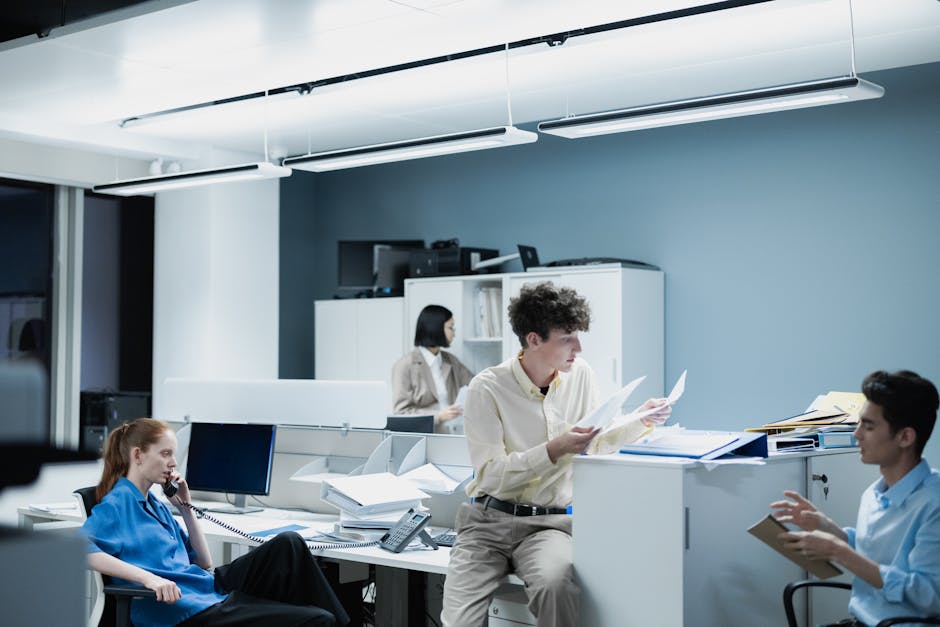Revolutionizing Workspace Efficiency: The Power of Desk Hoteling
"Explore the concept of desk hoteling and its impact on contemporary work environments. Learn how this innovative approach enhances flexibility, reduces costs, and improves collaboration in hybrid workplaces, making it an essential strategy for forward-thinking organizations. "

Revolutionizing Workspace Efficiency: The Power of Desk Hoteling
In today's rapidly evolving work landscape, organizations are constantly seeking innovative ways to optimize their workspace and accommodate the needs of a hybrid workforce. One solution that has gained significant traction is desk hoteling. This article explores the concept of desk hoteling, its benefits, and how it's reshaping the modern workplace.

What is Desk Hoteling?
Desk hoteling is a flexible workspace management system that allows employees to reserve desks or workspaces for specific periods, rather than having permanently assigned seats. This approach is particularly beneficial for companies embracing hybrid work models, where employees split their time between remote and in-office work.
Key Features of Desk Hoteling:
- Advance Booking: Employees can reserve workspaces ahead of time, ensuring they have a suitable place to work when they come to the office.
- Flexible Duration: Reservations can range from a single day to several weeks or even months, depending on the organization's policies.
- Resource Optimization: It allows companies to make the most of their available office space, reducing wasted resources.
The Difference Between Desk Hoteling and Hot Desking
While often used interchangeably, desk hoteling and hot desking have subtle differences:
- Desk Hoteling: Involves pre-booking workspaces for longer durations.
- Hot Desking: Typically refers to short-term, often same-day use of available desks on a first-come, first-served basis.
Both strategies aim to increase workspace flexibility, but desk hoteling offers more structure and predictability for employees and employers alike.
Benefits of Implementing Desk Hoteling
Adopting a desk hoteling system can bring numerous advantages to both employees and organizations:
-
Cost Savings: By optimizing space usage, companies can significantly reduce real estate costs and overhead expenses.
-
Enhanced Collaboration: Flexible seating arrangements encourage interaction between different teams and departments, fostering innovation and creativity.
-
Improved Employee Experience: Offering choice and flexibility in workspace selection can boost employee satisfaction and productivity.
-
Efficient Space Utilization: Real-time data on desk usage helps facilities managers make informed decisions about office layout and capacity.
-
Environmental Benefits: Reduced office space requirements can lead to a smaller carbon footprint for the organization.

Implementing a Successful Desk Hoteling Strategy
To make the most of desk hoteling, consider the following steps:
-
Define Clear Objectives: Determine what you hope to achieve with desk hoteling, whether it's cost reduction, improved collaboration, or enhanced flexibility.
-
Choose the Right Technology: Invest in user-friendly desk booking software that integrates with your existing systems.
-
Establish Guidelines: Create clear policies around desk reservations, usage, and etiquette to ensure smooth operations.
-
Communicate Effectively: Ensure all employees understand how to use the system and the benefits it brings to their work experience.
-
Provide Necessary Support: Offer training and ongoing assistance to help employees adapt to the new system.
-
Monitor and Adjust: Regularly collect feedback and analyze usage data to refine your desk hoteling strategy over time.
Overcoming Potential Challenges
While desk hoteling offers numerous benefits, it's important to address potential challenges:
-
Resistance to Change: Some employees may be hesitant to give up their permanent desks. Address concerns through open communication and by highlighting the benefits of the new system.
-
Technology Issues: Ensure your booking system is reliable and user-friendly to prevent frustration and confusion.
-
Maintaining Company Culture: With a more fluid workspace, find ways to maintain a sense of community and belonging among employees.
-
Balancing Privacy and Collaboration: Provide a mix of open collaborative spaces and private areas to cater to different work styles and needs.

The Future of Workspace Management
As hybrid work models continue to evolve, desk hoteling is likely to become an integral part of modern office design and management. By embracing this flexible approach, organizations can create more dynamic, efficient, and employee-centric workspaces that adapt to the changing needs of their workforce.
Conclusion
Desk hoteling represents a significant shift in how we think about and utilize office space. By offering flexibility, optimizing resources, and fostering collaboration, it addresses many of the challenges faced by modern organizations. As we move towards a more flexible and hybrid work future, desk hoteling will undoubtedly play a crucial role in shaping efficient, cost-effective, and employee-friendly workplaces.
Implementing a desk hoteling system requires careful planning and the right tools, but the benefits in terms of space utilization, cost savings, and employee satisfaction make it a worthwhile investment for forward-thinking organizations. As you consider adopting this approach, remember that the key to success lies in clear communication, robust technology, and a willingness to adapt based on feedback and changing needs.
By embracing desk hoteling, you're not just optimizing your office space – you're creating a more agile, responsive, and future-ready workplace that can thrive in the ever-changing landscape of modern work.
Want to learn more about Hybrid Work?
Explore our complete guide with more articles like this one.


